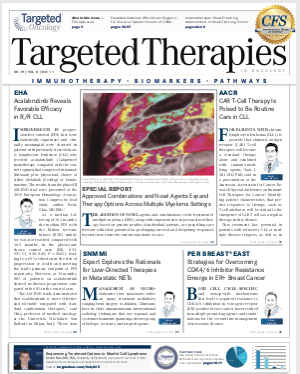CAR T-Cell Therapy Poised to Become Routine Care in CLL
The initial pilot study of CTL019 in heavily pretreated CD19-positive hematologic malignancies demonstrated the feasibility of CAR T-cell therapy in patients with CLL. A presentation at the 2019 American Society of Gene & Cell Therapy Annual Meeting reported 2 cases of chemotherapy-resistant CLL, with ongoing follow- up at 8 years showing persistence of CAR-engineered T cells and sustained remission, as determined by flow cytometry and deep sequencing of immunoglobulin H rearrangements.
Saar I. Gill, MD, PHD

Saar I. Gill, MD, PHD
For patients with chronic lymphocytic leukemia (CLL), it’s possible that chimeric antigen receptor (CAR) T-cell therapies will become a standard therapy alone and combined] with immune-modifying agents, Saar I. Gill, MD, PhD, said in a presentation at the American Association for Cancer Research Special conference on Immune Cell Therapies for Cancer.1Identifying patient characteristics that predict responses to therapy, such as T-cell attributes, will be critical to the emergence of CAR T cells as a regular therapy in this disease.
This treatment has potential in patients with refractory CLL or multiple disease relapses, as well as in patients who are in earlier lines of therapy, said Gill, the scientific codirector of cell therapy and transplantation and an assistant professor of medicine at the University of Pennsylvania Perelman School of Medicine in Philadelphia.
The initial pilot study of CTL019 (tisagenlecleucel; Kymriah) in heavily pretreated CD19-positive hematologic malignancies demonstrated the feasibility of CAR T-cell therapy in patients with CLL. A presentation at the 2019 American Society of Gene & Cell Therapy Annual Meeting reported 2 cases of chemotherapy-resistant CLL, with ongoing follow- up at 8 years showing persistence of CAR-engineered T cells and sustained remission, as determined by flow cytometry and deep sequencing of immunoglobulin H rearrangements. Results from patients in this trial represent the longest persistence of CAR T cells reported thus far.2
Investigators concluded that responses to the disease are most likely mediated by highly activated CD8-positive CAR T cells that initiate tumor clearance and sustained by CD4-positive cells that persistently engage with target cells.2Gill said that in cases where CAR T-cell therapy induces a remission, relapses are uncommon even in those with highly refractory CLL.1
Predictors of CAR T Success in CLL
At a median follow-up of 19 months, 8 of 14 patients with CLL (57%; 95% CI, 29%-82%) had a response to therapy including 4 complete responses (CRs; 29%).3Other trials of CD19-targeted CAR T therapy in CLL have demonstrated overall response rates (ORRs) ranging from 12% to 100%, with CRs ranging from 0% to 67%.1Compared with other malignancies, such as acute lymphoblastic leukemia, which has demonstrated an overall remission rate as high as 81%,4responses occur at low frequencies and translate into lower rates of progression-free survival (PFS) and overall survival, especially in nonresponders with CLL.1
Barriers to CAR T cell success in CLL include difficulty in predicting who will have a response to therapy. Neither age, prior therapy, cell dose, nor genetic risk have been found to be associated with enhanced outcomes to therapy. “Responses may vary due to differences in innate, humoral, and cellular immune deficiencies,” Gill said. “The best correlate of response so far is the degree of expansion of CAR T cells in the patient.”
Prior data showed that intrinsic T-cell defects in CLL impair in vivo expansion of CAR T cells and pose a problem for both generating cells and the feasibility of a response.5Expression of PD-L1, TIM-3, and LAG-3 on cells has also been associated with poor outcomes; patients with complete and durable remissions tend to be infused with products containing lower frequencies of these cells.6
Improving Responses
A study by Joseph A. Fraietta, PhD, evaluated total genomic DNA in patients with CLL treated with either CTL019 or ibrutinib (Imbruvica). The results demonstrated that T cells from those treated with the Bruton tyrosine kinase (BTK) inhibitor had “superior proliferative capacity in vitro, superior survival in vitro, and reduced PD-1 expression on CD8-positive T cells,” Gill said. This finding was associated with improved functional activity. Furthermore, ibrutinib was not associated with impaired CAR gene transfer, T-cell expansion, or cytotoxic capacity in vitro.
In a pilot trial of CTL119, an autologous anti-CD19 CAR T-cell therapy, in adult patients with CLL or small lymphocytic leukemia who did not achieve CR with at least 6 months of ibrutinib therapy, ORR and CR rates at 3 months were 71% and 43%, respectively.7At 12 months, Gill said, 72% of patients were negative for measurable residual dis- ease (MRD) and had a bone marrow CR. At last follow-up, 16 patients of 18 remained in morphologic and/or flow CR.
These results, Gill said, “compare favorably with prior CAR 19 [T]-cell studies in patients with progressive CLL,” which have shown CR rates of 21% to 35%. This shows feasibility of the use of CAR T cells for CLL in patients with multiple relapses or refractory disease.
Gill introduced the possibility of CAR T-cell therapy for earlier lines of treatment over biological therapies because of the short treatment duration; high rates of MRD negativity, which may correlate with longer-term PFS in these patients; and financial preference. It may also be a better option in those who are not likely to respond to other therapies, such as patients with resistance to BTK inhibitors.
References
- Gill SI. CLL: potential roles for CAR T-cell therapy. Presented at: Immune Cell Therapies for Cancer: Successes and Challenges of CAR T Cells and Other Forms of Adoptive Therapy; July 19-22, 2019; San Francisco, CA.
- Melenhorst JJ, Porter DL, Nobles CLL, et al. Long-term remission of CLL sustained by oligoclonal CD19-specific chimeric antigen receptor T cell clones. Presented at: 2019 American Society of Gene & Cell Therapy Annual Meeting; April 29-May 2, 2019; Washington, DC. Abstract 358. bit.ly/2Y7wu2n.
- . Porter DL, Hwang W-T, Frey NV, et al. Chimeric antigen receptor T cells persist and induce sustained remission in relapsed refractory chronic lymphocytic leukemia.Sci Transl Med.2015;7(303):303ra139. doi: 10.1126/scitranslmed.aac5415.
- Maude SL, Laetsch TW, Buechner J, et al. Tisagenlecleucel in children and young adults with B-cell lymphoblastic leukemia.N Engl J Med.2018;378(5):439-448. doi: 10.1056/NEJMoa1709866.
- Fraietta JA, Beckwith KA, Patel PR, et al. Ibrutinib enhances chimeric antigen receptor T-cell engraftment and efficacy in leukemia.Blood.2016;127(9):1117-1127. doi: 10.1182/ blood-2015-11-679134
- Fraietta JA, Lacey SF, Orlando EJ, et al. Determinants of response and resistance to CD19 chimeric antigen receptor (CAR) T cell therapy of chronic lymphocytic leukemia.Nat Med.2018;24(5):563-571. doi: 10.1038/s41591-018-0010-1.
- Gill SI, Vides V, Frey NV, et al. Prospective clinical trial of antiCD19 CAR T cells in com- bination with ibrutinib for the treatment of chronic lymphocytic leukemia shows a high response rate.Blood.2018;132(suppl 1; abstr 298). doi: 10.1182/blood-2018-99-115418.

Enhancing Precision in Immunotherapy: CD8 PET-Avidity in RCC
March 1st 2024In this episode of Emerging Experts, Peter Zang, MD, highlights research on baseline CD8 lymph node avidity with 89-Zr-crefmirlimab for the treatment of patients with metastatic renal cell carcinoma and response to immunotherapy.
Listen
Beyond the First-Line: Economides on Advancing Therapies in RCC
February 1st 2024In our 4th episode of Emerging Experts, Minas P. Economides, MD, unveils the challenges and opportunities for renal cell carcinoma treatment, focusing on the lack of therapies available in the second-line setting.
Listen
Deciding Factors for Front-Line Therapy in Metastatic RCC
April 17th 2024During a Case-Based Roundtable® event, Shilpa Gupta, MD, led a discussion on what factors influence physician decision making for frontline therapy in patients with metastatic renal cell carcinoma in the first article of a 2-part series.
Read More